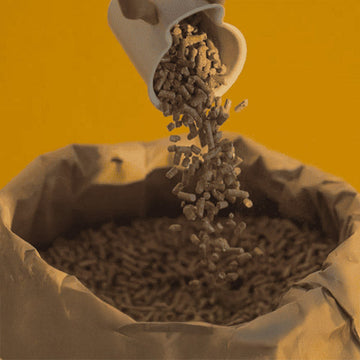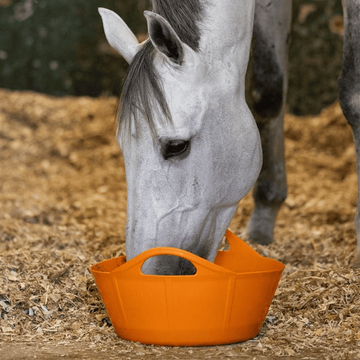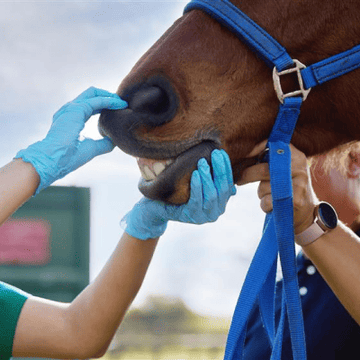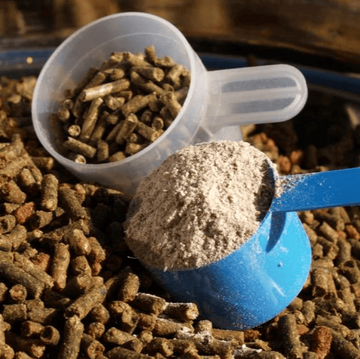1 – “Concentrated feed is the basis of a horse’s diet; hay is secondary.”
Forage (pasture, hay) should make up 60 to 100% of a horse’s diet. Concentrated feeds should only be provided to horses in work and/or competition, mares in the last third of pregnancy and during lactation, and other horses with increased energy and protein needs. In cases where the hay alone does not meet energy and nutrient requirements, a complementary feed should be added.
In summary, for a correct and balanced diet, it is estimated that a horse should ingest about 2% of its body weight in dry matter per day. For a 500 kg horse, this is about 10 kg of dry matter; ideally, these 10 kg should include at least 6 to 7 kg of forage.
2 – “A protein-rich concentrate makes my horse excitable.”
Feeding a horse an excessively high-protein diet leads to increased production of body heat and ammonia, but not necessarily to an excitable temperament.
However, studies have shown that diets high in non-structural carbohydrates (starch and simple sugars) are linked to potentially excitable behaviour. Therefore, special attention should be paid to concentrates high in starch and sugar. Horses with naturally excitable temperaments benefit from feeds low in starch and sugar.
3 – “Feeding grains causes colic in horses.”
The term “colic” refers to abdominal pain, which can be caused by many different factors. The horse’s digestive tract is long and complex, making it susceptible to inflammation, distension, displacements, and so on. Poor feeding management can indeed lead to colic, so it’s important to assess specific aspects of the diet, such as feed characteristics, feeding routine, among others.
The risk of colic increases with: high intake of concentrate feed (more than 4–5 kg/day for a 500 kg horse); restricted or no access to pasture; low intake of forage (less than 5–6 kg/day for a 500 kg horse); poor quality forage; reduced water intake; and other factors.
4 – “Alfalfa is too rich and unsafe to feed to horses.”
Alfalfa has higher protein, digestible energy and calcium levels than grass hay, but it is generally lower in soluble sugars. Its reputation for being “too rich” comes from its highly nutritious, digestible leaves, which, if introduced too quickly, may indeed contribute to gastrointestinal problems or colic. It is therefore advisable to introduce alfalfa gradually so the horse can adapt.
Feeding only alfalfa as the sole forage source is discouraged; it is better to combine limited amounts of alfalfa with grass hay to avoid excessive energy, protein, or calcium intake.
Alfalfa helps protect against ulcers (thanks to its buffering effect from high protein and calcium content) and is considered beneficial in preventing developmental orthopaedic diseases (DODs) in foals.
5 – “High-protein diets cause DODs (developmental orthopaedic diseases) in growing horses.”
Nutrition, exercise and genetics are the main factors determining healthy bone development, but they can also contribute to DODs.
Mineral imbalances and incorrect protein levels are identified as potential causes of DODs. Feeding growing foals more protein than needed won’t make them grow faster, just as restricting protein won’t necessarily improve bone development. However, cutting protein by feeding less feed can reduce growth rates and affect bone development. It is essential to feed a diet specifically formulated for foals.
6 – “Allowing a hot and tired horse to drink right after work causes colic.”
Several studies have shown that a “hot” and sweaty horse that drinks water immediately after exercise does not have a higher risk of colic or laminitis compared to horses that drink only after cooling down. Therefore, it is recommended to let the horse drink when it feels thirsty, which usually happens right after exercise, rather than waiting for it to cool off. Waiting may result in lower water intake even when the horse is dehydrated, which is undesirable.
7 – “A horse’s weight issues are only related to its diet.”
Not necessarily. Weight issues in horses (either overweight or underweight) may result from many factors, such as dental problems, parasites, systemic diseases, metabolic disorders, laminitis, and more. If a horse gains or loses significant weight, it’s advisable to consult a veterinarian and/or equine nutritionist.



